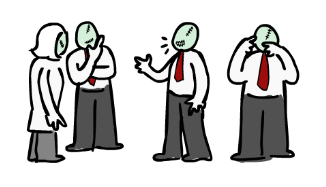The focus of this post is on communications or the lack thereof. One of the definitions of "communicate" is
to give or interchange thoughts, feelings, information, or the like, by writing, speaking, etc.
When dealing with people, regardless if its your customer or your team, you have to communicate. This involves, in one fashion or another, speaking and listening. I've written about how I feel speech can be presented different ways. I know my wife is going to call me a hypocrite but you really need to stop....listen....stop...talk.
First, you have to be in agreement as to when, where, and how you're going to communicate with each other. Once you get that out of the way, the things you say and the things people hear are not always the same thing. You can't have agreement until the thing you say and the thing someone hears are the exact same thing. So, what is a way to help ensure someone hears what you intended them to hear? You need to ask questions. The next time you are talking with someone, ask questions so you feel completely confident they heard exactly what you wanted them to hear. Once you make it past that, things should go much smoother because you'll both be seeing eye-to-eye. (Thank you Simon Sinik for that)
Above you see a very simple graphic.
A is doing all of the talking
Notice that he is facing the listeners. He's engaging them. He's talking but is he listening? Is he asking any questions?
B are doing all of the listening
Notice how engaged these two look. They must really be listening to what A has to say. Unfortunately, they are not reciprocating. They should inform A that his brain is about to be eaten. Granted, they may have said something like "You need to watch your back". If A doesn't ask "when" or "what do you mean" he needs to watch his back, he's going to be zombified.
C is a zombie
Zombies are not good communicators. They don't speak, other than an occasional moan. They don't listen, unless you're crying for help. In that case, they come and eat your brain. For example, I can scream "Don't eat my brain, don't eat my brain!" Will a zombie listen? No, they'll eat your brain because all they hear is "brain". Note to self: Zombies are not team players and they are also poor communicators.
This is what happens when people don't listen. The zombie attacked A, who was doing all of the talking. Both A and C zombified B. This is what you get if you're not a good listener. Perhaps this would not have happened if they were reading each other's body language. But that will be left for another post.
Like the images? Find them at Pictofigo



